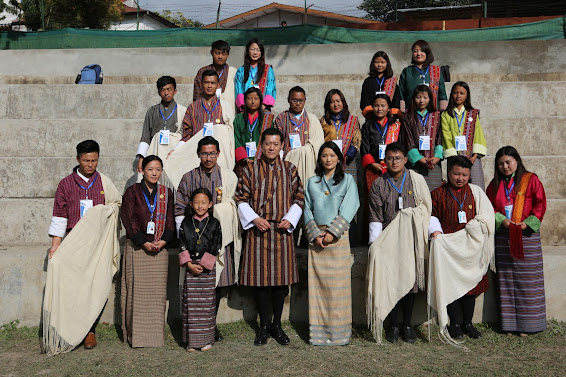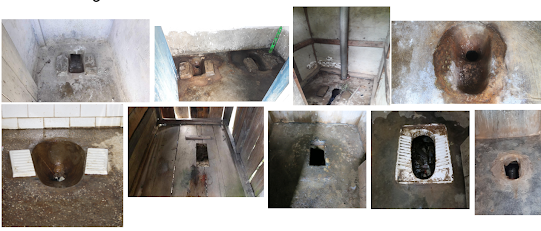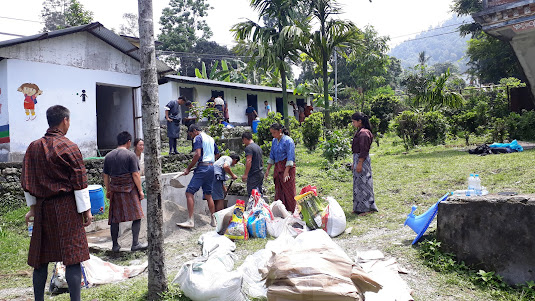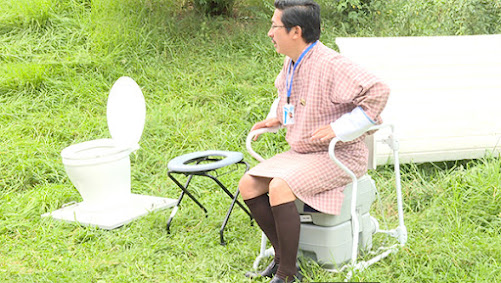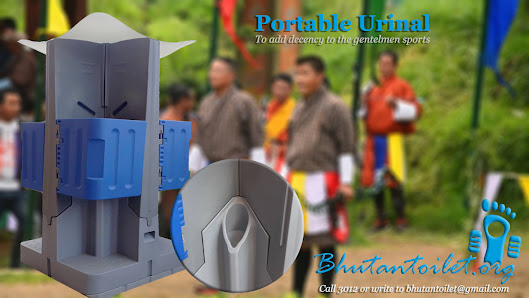At the 2016 World Toilet Summit in East Malaysia, heads of toilet associations of different countries took to the stage and shared great stories about their works and achievements. The scale of their work and the technologies they used were incredible, but one tragic twist in all their stories was the lack of support from the leadership of their countries. They were yet to convince their leaders of the significance of what they were doing. They were fighting to get their leaders’ attention to their cause.
I was to speak in the afternoon of the second day of the summit. By then, people had heard enough toilet stories to have any more appetite, let alone from an underdog of a small country. Attending the summit for the first time, the afternoon slot was the best I could get, which was seemingly the time when the hall gradually became empty.
I projected the photograph of His Majesty the King and me, which mirrored on some seven giant screens across the gigantic hall, and told them stories of how I have the blessings of my King in what I do. When I told them that His Majesty the King not only recognized my work but also bestowed upon me a new title of Toilet Teacher, I heard the loudest round of applause in that hall that boring afternoon. That made me the only country representative at the summit who, with a little guilt of having to contradict the rest in the house, spoke proudly about having the support of the King of his country.
The crowd wouldn’t be able to comprehend if I told them that the very idea of such initiatives was inspired by the King himself, who in his national addresses subtly sowed the seeds in the minds of his people.
In 2015, during the Royal Bhutan Flower Exhibition in Paro, His Majesty said, “Where we live must be clean, safe, organized, and beautiful, for national pride, national integrity, and for our bright future. This too is nation-building.” I was then experimenting with Bhutan Toilet Org as an online campaign, and that royal message seemed to me like a personal command. I immediately began working on making toilets across the country ‘clean, safe, organized, and beautiful,’ and that was the turning point.
When His Majesty summoned me during the 2016 Paro Tshechu, where I was managing the public toilet along with a team of over sixty young people, I was least expecting it. I still have a vivid memory of that auspicious moment. Dasho Zimpon made me wait on the bridge. I was the only person kept on the bridge, and the next person I would see was His Majesty. I could see thousands of people on both ends of the bridge waiting to get a glimpse of His Majesty, and here I was waiting to meet my King face to face.
Then came the moment. I couldn’t look up directly, but I could make out from the approaching radiance that His Majesty had come. I bowed down to pay my respects and froze back to stillness. His Majesty congratulated me on the clean toilet facility we had arranged for the public at the Tshechu ground. For the King to know about the condition of the public toilet at a local festival was enthralling.
I had crossed that bridge a thousand times in my life, but even in my most beautiful dream, I hadn’t seen myself walking with the King and talking about toilets. The bridge seemed too short that day. At the other end of the bridge, His Majesty stopped and shared very personal stories of toilet issues in our country and how things are in other countries. I pledged my commitment and resolve to work for the cause till the end, and it was perhaps then that I truly felt the gravity of the responsibility. With the blessing of the King himself, everything suddenly seemed so possible.
To make this precious moment live with me forever, His Majesty put his left arm around my shoulder and granted a Kupar, with special permission to share it on social media. He knew I would need this to remain motivated each day, to rise above the social stigma, and to influence people to support me. The photograph that was released that evening worked its first magic on my mother, who was, until then, upset at me for leaving my job and going around cleaning public toilets.
Before I could fully absorb the glory of this moment, I heard my name in His Majesty’s address at the closing ceremony of the second flower exhibition at Ugyen Pelri Palace ground. It didn’t feel real until someone pushed me right in front to face His Majesty. In a dream-like state, I could hear His Majesty: “Passang used to be a teacher. He resigned to take up the task of providing clean toilets to people… and I have been thinking of giving him a name… I should call him Chablop.”
For the King to bestow me a name in public carried profound significance. I knew it wasn’t for what I had done but for what I must do. The title was to be attached to my name to remind me each day to work toward truly deserving and honoring it.
Since then, Bhutan Toilet Org has grown into one of the most effective civil society organizations that has started a toilet revolution in the country, as envisioned and guided by His Majesty the King.
And in 2024, after eight years of unwavering service, I finally felt deserving of the title that was bestowed upon me. I officially changed my name to Chablop Passu, embracing not just the honor but also the responsibility that comes with it. His Majesty’s blessing was not only a profound personal gift but also a message to the people of Bhutan—when the King places his trust in someone, it is a call for everyone to show their support.



